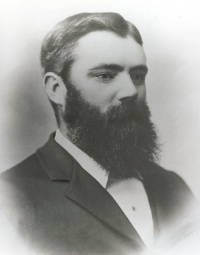Elijah Eyles
From The Orange Wiki
Elijah Eyles and his brother William were the first people to commercially grow fruit in the Orange district. The pair arrived in Orange in 1874 and established a fruiterer's business in Summer Street. Three years later they purchased 16 acres of land in the Canobolas foothills which they named Glenfern and planted out with fruit trees. They purchased a further 25 acres on Bathurst Road: City Garden. The two orchards contained 3,100 apple trees, 150 cherry trees and numerous pear, peach, quince, and plum trees.
By 1882 the Eyles Brother were exhibiting "splendid specimens of vegetables and fruit" at local agricultural shows. Such was their success that, in August 1884, the Australian Town and County Journal recommended that cereal farmers follow the Eyles Brothers example and plant fruit trees. The newspaper reported that the Eyles had sent a sample of fruit to England to test the possibility of potential future marketing. The fruit had arrived in "a sound and marketable state" and was highly praised by the recipients. Their cherries “surpass for size and lusciousness any ever before grown in the colony."
The brothers were regular exhibitors at the Hawkesbury Agricultural Show where their fruit and vegetables were usually awarded first or second prize.
In early 1886 the brother sent eight cases of apples and a case of quinces to London for display at the Colonial and Indian Exhibition. Opened in May by Queen Victoria, some 5.5 million people viewed the exhibition.
Elijah Eyles was born at Field of Mars in 1848, the fourth of eleven children of agriculturalists William and Matilda Eyles. He married Margaret (Maggie) Fitzgerald in Orange in 1876. The Fitzgerald family was prominent in the early development of the Mullion Creek district. The couple had six children, two of whom died in infancy.
In March 1885 Mr Eyles was elected alderman with Orange Municipal Council following the resignation of Patrick Kenna. He served on council for until 1891, with one term as mayor 1889-1890. Known for his generosity and unassuming but diligent nature, Elijah was popular and widely respected by the local community. He was also a prominent member of the Masonic fraternity.
Mr Eyles fell ill in early March 1892. He failed to recover and passed away on 11 March, aged just 43 years. He was buried in Orange General Cemetery the following day. Eyles Street in Orange is named in honour of Elijah and his brother William.
Three months Elijah’s death Margaret successfully applied for a publican’s licence to operate the Standard Hotel in Anson Street. She ran the hotel for eight years, until June 1900. By 1933 Margaret, aged 83, had moved to her daughter Beatrice’s house in Summer Hill, Sydney. It was there that she died on 22 November 1934. She is buried in the Catholic section of Rookwood Cemetery.

